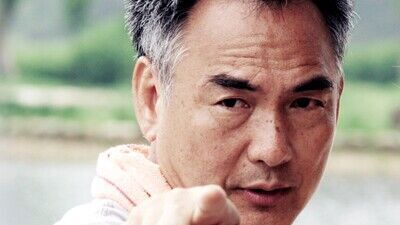Yuen eventually stopped focusing on acting for the camera. “I never wanted to be a movie star,” he said in a 2003 LA Times profile. “I figured out right away that unless you are a really big star, it is always the director who’s in charge.” Yuen’s describing the creative freedom that Hong Kong directors were often granted by their producers, a sharp contrast to the way things were typically done on Yuen’s American and European productions. “In Hollywood, once you’ve had the meeting with the studio, everything is decided,” Yuen told the New York Times. “If you want to change anything, you have to have other meetings, and it will take a week. But the intuitions often come in the middle of doing something, so working in Hong Kong, where there’s an intuition, you can immediately incorporate it into the action.”
Yuen knew from first-hand experience that, in action movies, you lose something when actors don’t do their own stunts. That’s another unfortunate contrast between much of the Asian and US/European productions that Yuen worked on. He was never one to stand on principle and even admitted that computer graphics were “the future in action.” (From 2002, in conversation with Variety’s Wendy Kan: “Films are like clothes, you have to keep up with the trends.”)
Yuen could also make do with any genre or trend, from a “God of Gamblers” parody to a lightly horny video game adaptation. He worked with singers like Coco Lee (“So Close”), Carina Lau (“She Shoots Straight”), and Anita Mui (“The Top Bet”) and gave early starring roles to new talent like Cynthia Rothrock and Michelle Yeoh (“Yes, Madam”). Before that, Yuen made Jean-Claude Van Damme look good in his first major role as an Ivan Drago-esque villain in the 1983 martial arts trend-chaser “No Retreat, No Surrender.” Yuen also directed a young Stephen Chow in one of his first major hits, “All for the Winner,” and very literally made the Taiwanese sex bomb Shu Qi fly in “So Close.”
To be fair, Yuen’s creative decisions didn’t come out of nowhere and were rarely the exclusive result of his ingenuity. His collaborators valued his work, and while he wouldn’t have gotten far without the patronage of his fellow Fortunes, who produced some of Yuen’s best 1980s productions, they wouldn’t have continued working with him if he wasn’t so good.
For example, Cynthia Rothrock received her first big break in the Yuen-helmed 1985 buddy cop thriller “Yes, Madam,” which was so successful that it led to a three-picture deal with Golden Harvest and the start of what became known as the “Girls with Guns” genre of Hong Kong action. Rothrock credits Yuen with her discovery, though “Yes, Madam” producer Sammo Hung first sought her out after he saw her interviewed on “World News Tonight with Peter Jennings.” Working with Yuen was demanding, as were Rothrock’s successive Hong Kong productions. “It was much easier to do Western films than the Hong Kong ones,” Rothrock told The Action Elite’s Nathan Phillips. “The action was not as extreme, and I had a script to study something I never had in Hong Kong.” Rothrock also told Phillips, as recently as 2015, that “My wish is to still today get in an A-listed movie or work with Cory Yuen again on another production.”

